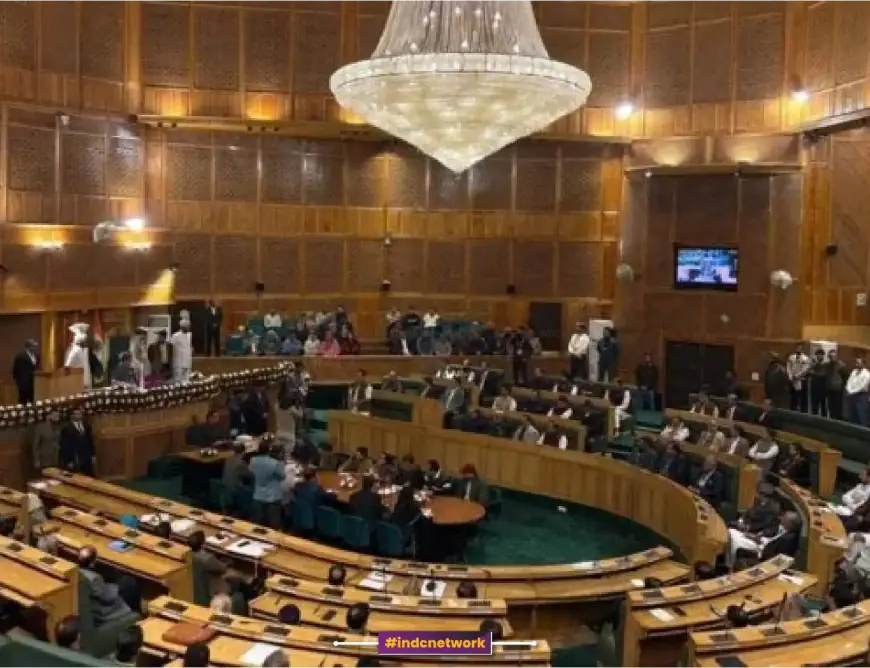Historic J&K Assembly Reopens After Six Years: Speaker Elected Amid Article 370 Controversy
The Jammu and Kashmir assembly reconvened after a six-year hiatus, electing veteran National Conference leader Abdul Rahim Rather as speaker. The session, however, saw tensions rise as PDP’s Waheed Parra introduced a resolution opposing the 2019 revocation of Article 370, sparking intense debate. Chief Minister Omar Abdullah dismissed the resolution as symbolic, saying it held little weight without broader backing. This session, scheduled to end on November 8, will also include a Motion of Thanks on the Lieutenant Governor's address and tributes for late legislators.

INDC Network : Jammu & Kashmir : Historic J&K Assembly Reopens After Six Years: Speaker Elected Amid Article 370 Controversy
Jammu & Kashmir Assembly Reopens After Six Years with Historic Speaker Election
After a six-year interval, Jammu and Kashmir’s assembly resumed proceedings, marking a historic moment for the region’s legislative process. Abdul Rahim Rather, a seasoned leader from the National Conference (NC) and a seven-time MLA, was elected as the new assembly speaker in this long-awaited session. Chief Minister Omar Abdullah, alongside pro-tem speaker Mubarak Gul, expressed congratulations to Rather, praising his commitment to public service across roles in both government and opposition. Abdullah highlighted Rather’s dedication and experience, calling him a "natural choice" for the post.
This opening session, scheduled to conclude on November 8, promises to address various critical issues facing Jammu and Kashmir, starting with the Lieutenant Governor’s address. In addition, the assembly will honor former legislators who have passed away since the last session held in 2018. A discussion on the Motion of Thanks on the LG’s address is also set for November 6 and 7.
Uproar Over Article 370: Debate Unfolds Following Controversial Resolution
Amidst these proceedings, the assembly witnessed intense debates when Waheed Parra, a People’s Democratic Party (PDP) MLA, introduced a resolution challenging the 2019 abrogation of Article 370 and advocating for the restoration of J&K’s special status. This act reignited the longstanding controversy surrounding the constitutional change. Chief Minister Omar Abdullah, however, downplayed the move, labeling it a "symbolic gesture" brought forward solely for public attention.
Addressing the House, Abdullah suggested that if there were genuine intent behind the resolution, the proposer would have first consulted the NC and other stakeholders, emphasizing that it ultimately holds limited practical weight. Abdullah's stance did not deter PDP’s support, with party chief Mehbooba Mufti publicly backing Parra’s resolution. On social media, Mufti praised her MLA’s efforts, expressing pride and calling for the restoration of Article 370 as a critical issue for J&K's future.
Political Dynamics in the New J&K Assembly: A Divided House
The recent assembly elections have set a new political landscape in Jammu and Kashmir, with the National Conference-Congress alliance emerging as the majority coalition, securing 49 out of 90 seats. The Bharatiya Janata Party (BJP), however, emerged as the largest opposition party, gaining 29 seats. This coalition has heightened political dynamics within the assembly, setting the stage for future legislative battles.
As the assembly session unfolds, both the ruling alliance and the opposition prepare to navigate complex issues such as regional autonomy, public sentiment on Article 370, and the path forward for Jammu and Kashmir’s governance. With a symbolic resolution and raucous debate over Article 370, this inaugural session after six years underscores the diverse and deeply rooted views that continue to shape the region’s political landscape.









